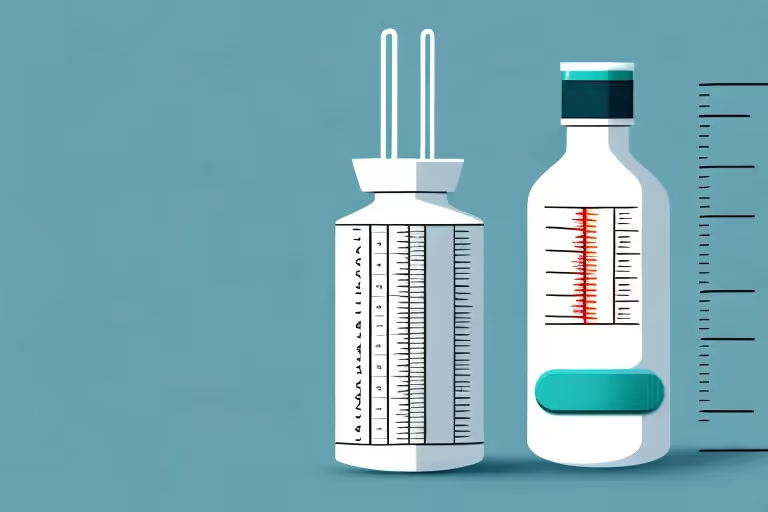If you're struggling with sleep disorders, Seroquel may have been suggested as a potential solution. But what is the maximum dosage of Seroquel for sleep? In this article, we'll explore the ins and outs of Seroquel, its connection to sleep, and how to determine the right dosage. We'll also discuss the risks of exceeding the maximum dosage and the potential side effects of Seroquel. So, let's dive in and uncover everything you need to know!
Understanding Seroquel: An Overview
Before we delve into the maximum dosage of Seroquel for sleep, let's first understand what Seroquel is all about. Seroquel, also known by its generic name quetiapine, is an antipsychotic medication primarily used to treat certain mental/mood conditions such as schizophrenia and bipolar disorder. However, it has also been prescribed off-label for sleep disorders due to its sedative effects.
Fall Asleep Faster and Stay Asleep Longer: Meet Aura, the #1 App for Sleep Sounds, Sleep Stories, Sleep Meditations, and More. Try it Free!
Seroquel belongs to a class of medications called atypical antipsychotics. It works by affecting certain neurotransmitters in the brain, specifically dopamine and serotonin, to help regulate the mood and behavior of individuals with mental disorders.
When it comes to using Seroquel as a sleep aid, it is important to understand how the medication works to induce drowsiness and promote sleep. The exact mechanism of how Seroquel achieves this is not fully understood, but researchers believe that its sedative properties are related to its ability to antagonize certain receptors in the brain.
One of the receptors that Seroquel targets is the histamine receptor. Histamine is a neurotransmitter that plays a role in wakefulness and alertness. By blocking histamine receptors, Seroquel can induce drowsiness and make it easier for individuals to fall asleep.
In addition to histamine receptors, Seroquel also antagonizes alpha-1 adrenergic receptors in the brain. These receptors are involved in regulating the release of norepinephrine, a neurotransmitter that plays a role in arousal and wakefulness. By blocking alpha-1 adrenergic receptors, Seroquel can further enhance its sedative effects, helping individuals achieve a deeper and more restful sleep.
It is worth noting that while Seroquel can be effective in promoting sleep, it is not without its potential side effects. Common side effects of Seroquel include drowsiness, dizziness, dry mouth, and constipation. In some cases, individuals may also experience weight gain and metabolic changes, so it is important to closely monitor any changes in body weight or overall health while taking this medication.
In conclusion, Seroquel, or quetiapine, is an antipsychotic medication that is commonly used to treat mental/mood conditions such as schizophrenia and bipolar disorder. Its sedative properties have led to its off-label use for sleep disorders. By targeting histamine and alpha-1 adrenergic receptors in the brain, Seroquel can induce drowsiness and promote sleep. However, it is important to weigh the potential benefits against the possible side effects before using Seroquel as a sleep aid.
The Connection Between Seroquel and Sleep
Now that we have a better understanding of Seroquel, let's explore its connection to sleep. Many individuals who struggle with sleep disorders, such as insomnia or certain types of depression, find relief when taking Seroquel as a sleep aid.
Sleep disorders can have a significant impact on a person's overall well-being. Lack of quality sleep can lead to daytime fatigue, difficulty concentrating, mood disturbances, and impaired cognitive function. Therefore, finding effective treatments for sleep disorders is crucial for improving the quality of life for individuals experiencing these issues.
Seroquel as a Sleep Aid
When prescribed for sleep disorders, Seroquel is usually administered at lower doses than when treating mental conditions. Its sedating effects help individuals fall asleep faster and maintain a more restful sleep throughout the night. However, it's important to note that Seroquel should only be used as a sleep aid under the guidance of a healthcare professional.
It is essential to have a comprehensive evaluation by a healthcare provider to determine the underlying cause of the sleep disorder before considering Seroquel as a treatment option. Sleep disorders can have various causes, including lifestyle factors, medical conditions, medications, and psychological factors. Identifying and addressing the root cause is essential for effective management.
The Science Behind Seroquel and Sleep
While the exact mechanism by which Seroquel improves sleep is not fully understood, research suggests that it may be related to its impact on various neurotransmitters and receptors in the brain. By modulating the activity of dopamine, serotonin, histamine, and adrenergic receptors, Seroquel can promote a more relaxed state and facilitate sleep.
The neurotransmitter dopamine plays a crucial role in regulating sleep-wake cycles. It helps to promote wakefulness during the day and inhibits sleep at night. By modulating dopamine receptors, Seroquel may help to reduce excessive wakefulness, allowing individuals to fall asleep more easily.
Serotonin, another neurotransmitter involved in regulating mood and sleep, is also affected by Seroquel. By blocking certain serotonin receptors, Seroquel may enhance the availability of serotonin in the brain, which can contribute to a more relaxed and calm state, promoting better sleep.
Additionally, Seroquel's impact on histamine and adrenergic receptors further contributes to its sedating effects. Histamine is involved in promoting wakefulness, and by blocking histamine receptors, Seroquel can help induce sleep. Adrenergic receptors, on the other hand, are involved in the body's stress response. By modulating these receptors, Seroquel can help reduce anxiety and promote a more relaxed state, facilitating sleep.
It is important to note that while Seroquel can be effective in promoting sleep, it is not without potential side effects. Common side effects of Seroquel include drowsiness, dizziness, and dry mouth. Serious side effects, although rare, can include tardive dyskinesia, neuroleptic malignant syndrome, and metabolic changes. Therefore, it is crucial to discuss the potential risks and benefits of Seroquel with a healthcare professional before initiating treatment.
In conclusion, Seroquel has shown promise in helping individuals with sleep disorders achieve better sleep. Its sedating effects, coupled with its impact on various neurotransmitters and receptors in the brain, contribute to its effectiveness as a sleep aid. However, it is important to approach the use of Seroquel for sleep under the guidance of a healthcare professional to ensure safe and appropriate treatment.
Fall Asleep Faster and Stay Asleep Longer: Meet Aura, the #1 App for Sleep Sounds, Sleep Stories, Sleep Meditations, and More. Try it Free!
Determining the Right Dosage of Seroquel for Sleep
When it comes to determining the right dosage of Seroquel for sleep, several factors need to be taken into account.
Factors Influencing the Dosage
Factors such as the severity of your sleep disorder, your age, overall health, and any other medications you may be taking can influence the appropriate dosage of Seroquel for sleep. It is crucial to consult with a healthcare professional who will assess your specific situation and provide personalized recommendations.
Typical Dosage Range for Sleep Disorders
The typical dosage range of Seroquel for sleep disorders is between 25 to 200 milligrams. However, the specific dosage may vary based on individual needs and response to the medication. It is important to start at the lowest effective dose and gradually increase as necessary under medical supervision.
Maximum Dosage of Seroquel for Sleep
Now, let's discuss the maximum dosage of Seroquel for sleep.
Understanding the Maximum Dosage
The maximum dosage of Seroquel for sleep varies depending on several factors, including the individual's tolerance, overall health, and the presence of any underlying medical conditions. In general, the maximum recommended daily dose of Seroquel for sleep is 800 milligrams.
Risks of Exceeding the Maximum Dosage
Exceeding the maximum dosage of Seroquel for sleep can increase the risk of experiencing adverse effects, including dizziness, drowsiness, rapid heartbeat, and potentially serious complications. It is crucial to follow the prescribed dosage provided by your healthcare professional and discuss any concerns or side effects with them.
Side Effects and Risks of Seroquel
Like any medication, Seroquel comes with potential side effects and risks.
Common Side Effects
The common side effects of Seroquel may include drowsiness, dizziness, dry mouth, constipation, blurred vision, and weight gain. These side effects are usually mild and tend to improve over time. However, if they persist or worsen, it is important to consult your healthcare provider.
Serious Risks and Warnings
In some cases, Seroquel can pose more serious risks, especially when used inappropriately or in combination with other medications. It may increase the risk of developing metabolic disorders, heart problems, and neuroleptic malignant syndrome (NMS) – a potentially life-threatening condition. It is crucial to inform your healthcare professional of all the medications you are taking to prevent any potential drug interactions or adverse effects.
In conclusion, Seroquel can be an effective sleep aid when used under medical supervision. The maximum dosage of Seroquel for sleep is typically 800 milligrams, but it is essential to consult with a healthcare professional to determine the appropriate dosage considering your specific circumstances and needs. Remember, it is important to be aware of the potential side effects and risks associated with Seroquel. If you have any concerns or experience any adverse effects, reach out to your healthcare provider. Stay informed and make educated decisions when it comes to your sleep health!
Looking for further ways to improve your sleep and overall well-being? Consider exploring the Aura Health App. With its diverse range of guided meditations, soothing sounds, and sleep stories, the app aims to support your journey towards a more restful and rejuvenating sleep. Give it a try and experience the benefits of a good night's sleep!
Aura is Your All In One App for Meditation, Mindfulness Wellbeing
Find peace every day with one app for your whole well-being. There is no one-size-fits-all solution to mental well-being. Aura is the first all-in-one wellness app that learns how to best help you. Discover an endless library of expert-created tracks for your well-being, all taught by the world’s best coaches, therapists, and storytellers. With Aura's personalized recommendations, you can find peace every morning, day and night.
Fall Asleep Faster and Stay Asleep Longer: Meet Aura, the #1 App for Sleep Sounds, Sleep Stories, Sleep Meditations, and More. Try it Free!



.webp)






.avif)

%20(1).avif)


.avif)
.avif)
.webp)


.avif)


















































































































.avif)

















.svg)








